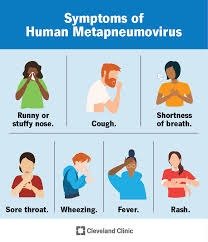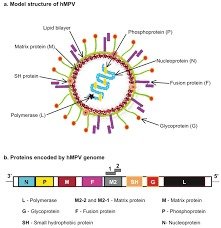New Delhi: Five years after the emergence of COVID-19 from China, another dangerous virus, Human Metapneumovirus (HMPV), is grabbing attention. People in many parts of China are currently facing an outbreak of HMPV. Authorities have urged citizens to wear face masks and wash hands frequently. But what exactly is HMPV, and what are its symptoms? Let’s find out more.
1. What is Human Metapneumovirus (HMPV)?
Human Metapneumovirus (HMPV) is a respiratory virus that causes mild infections similar to the common cold. It was first identified by scientists in 2001 and belongs to the Paramyxoviridae family, which also includes viruses like Respiratory Syncytial Virus (RSV), Measles, and Mumps. HMPV can infect both upper and lower respiratory tracts and is typically seen during winter and early spring. Children, the elderly, and those with weakened immune systems are more susceptible to this infection.
2. What Are the Symptoms of HMPV?
The symptoms of HMPV are similar to those of a common cold and can include cough, runny or stuffy nose, sore throat, fever, and wheezing. If these symptoms last for three to six days, the person may be infected with the virus. In most cases, the illness improves on its own with rest and home care within a few days. However, in some individuals, it can lead to more severe conditions like bronchitis or pneumonia, which may require medical treatment.

3. How is HMPV Spread?
HMPV spreads through direct contact with an infected person or by touching objects contaminated with the virus. It can spread through the following ways:
- Coughing and sneezing that release virus-laden droplets.
- Close contact with an infected person, such as handshakes or hugs.
- Touching contaminated surfaces like door handles, phones, or keyboards, and then touching the mouth, nose, or eyes.
Just like during the COVID pandemic, it is important to take similar precautions to avoid transmission.
4. How is HMPV Treated?
Currently, there is no vaccine or specific antiviral treatment for HMPV. Most people require over-the-counter medications to relieve fever and pain, possibly along with decongestants. Antibiotics will not work for HMPV as it is a viral infection.

5. Can HMPV be Prevented?
Yes, just like with other respiratory viruses, the best way to prevent HMPV is by practicing good hygiene. This includes:
- Washing hands frequently with soap and water.
- Avoiding close contact with infected individuals.
- Refraining from touching your face, nose, eyes, or mouth.
- Wearing a mask if you suspect you might be infected to prevent spreading the virus to others.
People with lung conditions like asthma or COPD should be extra cautious and take steps to avoid getting infected







